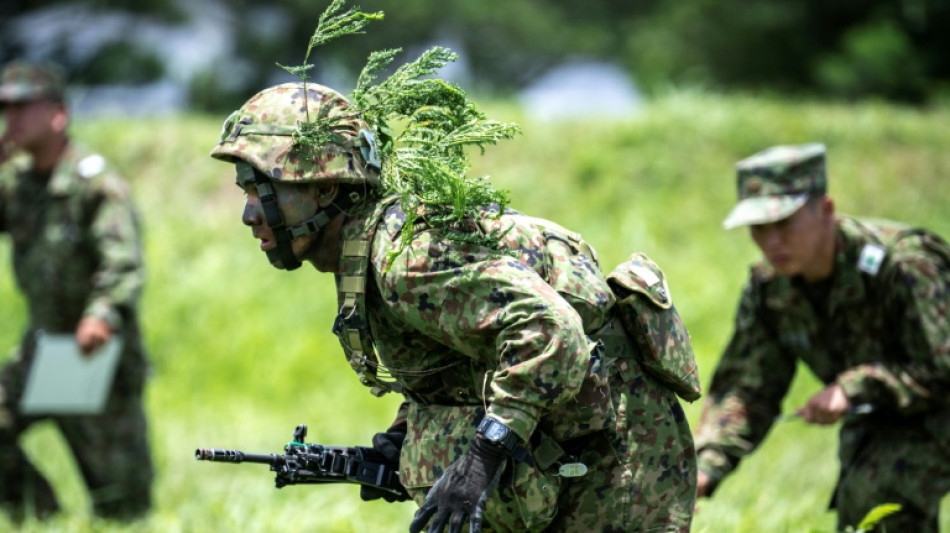
-
 Liverpool down Real Madrid in Champions League, Bayern edge PSG
Liverpool down Real Madrid in Champions League, Bayern edge PSG
-
Van Dijk tells Liverpool to keep calm and follow Arsenal's lead

-
 PSG left to sweat on injuries to Dembele and Hakimi
PSG left to sweat on injuries to Dembele and Hakimi
-
Reddit, Kick to be included in Australia's social media ban

-
 Ex-Zimbabwe cricket captain Williams treated for 'drug addiction'
Ex-Zimbabwe cricket captain Williams treated for 'drug addiction'
-
Padres ace Darvish to miss 2026 MLB season after surgery

-
 Diaz hero and villain as Bayern beat PSG in Champions League showdown
Diaz hero and villain as Bayern beat PSG in Champions League showdown
-
Liverpool master Real Madrid on Alexander-Arnold's return

-
 Van de Ven back in favour as stunning strike fuels Spurs rout
Van de Ven back in favour as stunning strike fuels Spurs rout
-
Juve held by Sporting Lisbon in stalling Champions League campaign

-
 New lawsuit alleges Spotify allows streaming fraud
New lawsuit alleges Spotify allows streaming fraud
-
Stocks mostly drop as tech rally fades

-
 LIV Golf switching to 72-hole format in 2026: official
LIV Golf switching to 72-hole format in 2026: official
-
'At home' Djokovic makes winning return in Athens
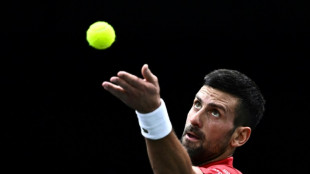
-
 Manchester City have become 'more beatable', says Dortmund's Gross
Manchester City have become 'more beatable', says Dortmund's Gross
-
Merino brace sends Arsenal past Slavia in Champions League

-
 Djokovic makes winning return in Athens
Djokovic makes winning return in Athens
-
Napoli and Eintracht Frankfurt in Champions League stalemate

-
 Arsenal's Dowman becomes youngest-ever Champions League player
Arsenal's Dowman becomes youngest-ever Champions League player
-
Cheney shaped US like no other VP. Until he didn't.

-
 Pakistan edge South Africa in tense ODI finish in Faisalabad
Pakistan edge South Africa in tense ODI finish in Faisalabad
-
Brazil's Lula urges less talk, more action at COP30 climate meet

-
 Barca's Lewandowski says his season starting now after injury struggles
Barca's Lewandowski says his season starting now after injury struggles
-
Burn urges Newcastle to show their ugly side in Bilbao clash

-
 French pair released after 3-year Iran jail ordeal
French pair released after 3-year Iran jail ordeal
-
EU scrambles to seal climate targets before COP30
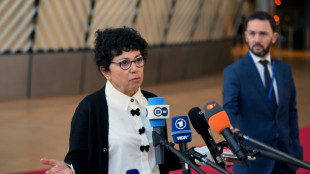
-
 Getty Images largely loses lawsuit against UK AI firm
Getty Images largely loses lawsuit against UK AI firm
-
Cement maker Lafarge on trial in France over jihadist funding

-
 Sculpture of Trump strapped to a cross displayed in Switzerland
Sculpture of Trump strapped to a cross displayed in Switzerland
-
Pakistan's Rauf and Indian skipper Yadav punished over Asia Cup behaviour

-
 Libbok welcomes 'healthy' Springboks fly-half competition
Libbok welcomes 'healthy' Springboks fly-half competition
-
Reeling from earthquakes, Afghans fear coming winter

-
 Ronaldo reveals emotional retirement will come 'soon'
Ronaldo reveals emotional retirement will come 'soon'
-
Munich's surfers stunned after famed river wave vanishes

-
 Iran commemorates storming of US embassy with missile replicas, fake coffins
Iran commemorates storming of US embassy with missile replicas, fake coffins
-
Gauff sweeps Paolini aside to revitalise WTA Finals defence

-
 Shein vows to cooperate with France in probe over childlike sex dolls
Shein vows to cooperate with France in probe over childlike sex dolls
-
Young leftist Mamdani on track to win NY vote, shaking up US politics

-
 US government shutdown ties record for longest in history
US government shutdown ties record for longest in history
-
King Tut's collection displayed for first time at Egypt's grand museum

-
 Typhoon flooding kills over 40, strands thousands in central Philippines
Typhoon flooding kills over 40, strands thousands in central Philippines
-
Trent mural defaced ahead of Liverpool return

-
 Sabalenka to face Kyrgios in 'Battle of Sexes' on December 28
Sabalenka to face Kyrgios in 'Battle of Sexes' on December 28
-
Experts call for global panel to tackle 'inequality crisis'
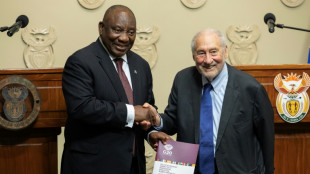
-
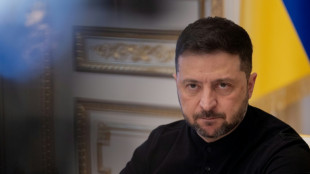 Backed by Brussels, Zelensky urges Orban to drop veto on EU bid
Backed by Brussels, Zelensky urges Orban to drop veto on EU bid
-
After ECHR ruling, Turkey opposition urges pro-Kurd leader's release
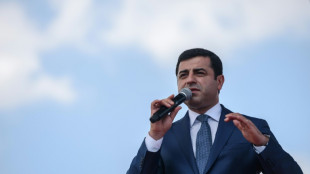
-
 Stocks drop as tech rally fades
Stocks drop as tech rally fades
-
UK far-right activist Robinson cleared of terror offence over phone access
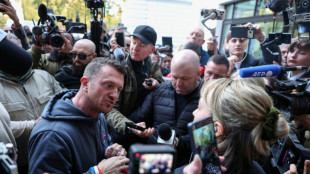
-
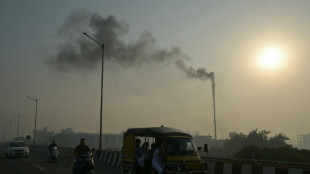 World on track to dangerous warming as emissions hit record high: UN
World on track to dangerous warming as emissions hit record high: UN
-
Nvidia, Deutsche Telekom unveil 1-bn-euro AI industrial hub


Pacifist Japan struggles to boost troops as China anxiety grows
Sporting dark face paint and clutching a gun, teenage soldier-in-training Takuma Hiyane crawls across a field on Japan's Okinawa, the front line of the nation's defence as anxiety grows over China's territorial ambitions.
As the world marks the 80th anniversary of World War II, Japan -- which has been officially pacifist since its defeat -- is trying to lure more talent into its armed forces.
Tokyo began upping its military spending in 2023 and aims to make it two percent of its gross domestic product by the end of the 2027 fiscal year, but has come under pressure from Washington to boost it even further.
Japan fears that China could attempt a forceful takeover of Taiwan -- the self-governed island it claims -- potentially triggering a conflict with Washington that could drag in Tokyo as well.
But it has been hard to convince enough young Japanese to enlist.
Hiyane, a 19-year-old former high school badminton player who signed up after his graduation in March, was swayed by the idea of helping victims of natural disasters, he said.
"I thought this was a job that I could contribute to my country and be proud of, so I decided to join," he told AFP, carefully dodging questions on the sensitive topic of national defence.
Tokyo wants a beefed-up military in southwestern regions such as Okinawa, home to some 70 percent of US military facilities in Japan and seen as strategically important for monitoring China, the Taiwan Strait and the Korean peninsula.
In 2023, the Japan Self-Defense Forces (SDF) aimed to hire almost 20,000 people, but recruited just half that number, according to the defence ministry.
Dangerous duties, low pay and a young retirement age of around 56 are off-putting for young Japanese, officials and experts say.
Japan's low birth rate, shrinking population and tight labour market are also complicating recruitment, leaving around 10 percent of the force's 250,000 positions unfilled.
- Better conditions -
On Okinawa, Hiyane and his fellow trainees braved scorching heat to stage a line formation, before dashing forward to capture a mock enemy fort.
"I find training here very physical and hard, but I am used to it in a way since I played sports at school," he said.
"I find it more exhausting and nerve-racking when I have to shoot guns."
Prime Minister Shigeru Ishiba said in June that increasing SDF numbers was "a top priority" given Japan's worsening security environment.
Kazuyuki Shioiri, who helps manage an infantry regiment in Okinawa where Hiyane trains, said increased defence expenditure was gradually making troops' lives better through various upgrades including air conditioning, cleaner bathrooms and more privacy in dormitories.
"We have been able to improve conditions," he said.
Before the extra funds, Japanese troops had complained that they lacked bullets and basic supplies.
They used to strip old tanks and jets for parts to repair newer equipment, the defence ministry said.
But it's not simply "muscular troops with high combat capabilities" that the force wants, said Toshiyuki Asou, an SDF recruiter on Okinawa.
"We are looking for a wide range of personnel now as national security involves everything from cybersecurity, space defence, electromagnetic warfare, and of course intelligence work," he added.
- Reluctant to fight -
Despite the government's defence push, Japanese citizens have traditionally kept their distance from the subject, with some still carrying bitter memories of the nation's militarist past.
Japan's constitution, which was drafted by the US after World War II and enjoys wide public support, bans Tokyo from using force and does not recognise the SDF as a formal military.
While the troops are highly respected, the public have loudly opposed any attempt to amend the constitution to grant them that status.
In a Gallup International survey released last year, only nine percent of Japanese respondents said they would fight for the country if there was a war, while 50 percent said they would not.
That compares with greater willingness in some other countries, with 46 percent of South Koreans, 41 percent of Americans and 34 percent of Canadians saying they would fight.
Ryoichi Oriki, the former head of the Joint Staff of the SDF, said during a recent press briefing that he wished for "greater understanding among the public about the reality of national defence".
In the field, new recruits said they were excited about launching their military careers despite the geopolitical turbulence.
"I have learned the spirit and skills of Self-Defense Force personnel," said Hiyane, who is about to complete his initial training. "I feel I have grown."
T.Ibrahim--SF-PST
